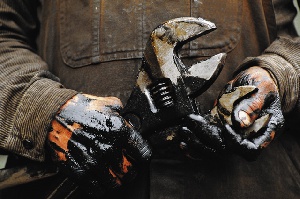Nii Armah Ashietey, Minister of Employment & Labour Relations, has called for accelerated capacity building for indigenes in Ghana’s oil and gas sector to enable them service oil rigs competently.
During the opening of the second African Regional Conference organized by LO-Norway and Ghana Trades Union Congress (GTUC) in Accra on the theme: “Oil for development – Making oil a blessing, not a curse,” Nii Ashietey said one of the critical ways to ensure the effective participation of citizens in the oil and gas sector is to ensure the effectual implementation of local content policy.
According to him, the Labour Department of the ministry will conduct periodic labour inspection of industrial establishments and other workplaces including the oil and gas sector to ensure compliance with the labour laws, regulations and standards by employers and employees.
He said that environmental pollution will also receive urgent attention to ensure that development takes place in environmentally-sustainable manner.
Nii Ashietey said government had introduced policies and programmes to ensure that oil revenues were used in the best interest of citizens, adding that “Ghana is a signatory to the Extractive Industries Transparency Initial (EITI) that seeks to bring transparency and accountability in the management of our petroleum revenues.”
He therefore urged Ghanaians to train adequately to attain the laudable feat.
Kofi Asamoah, Secretary General of Ghana Trades Union Congress (GTUC), in a speech, said though Ghana has not performed abysmally in its third year of oil production, there were signs that the country faces the threat of Dutch diseases.
“In 2011, when overall economic growth hit a record 14 percent, agriculture grew by less than one percent. Manufacturing growth rate was negative.
According to him, political polarization had reached levels that portended danger for the country’s stability.
“For the first time, we have a hotly disputed election that has ended up at the Supreme Court. These are clear signs that like the other countries on the continent, oil is changing the economic and political dynamics of the country.”
Mr. Asamoah said trade unions on the continent could play useful roles in changing the situation, adding that “this, we can do by organizing and mobilizing workers for collective action.”
He said by organizing and undertaking collective bargaining, workers conditions could be improved in the oil and gas industry.
However, he noted: “We need to organize and use our collective strength for policy engagement with government and also the multinational corporations in the oil and gas industry”.
Mr. Asamoah said there were a number of issues that Government needed to address, including the current legislation governing the extraction industry which was overly generous to foreign companies.
“We need to change that and give the people a greater share of the resources we claim they own.”
Mr. Asamoah said there was low verification capacity that often interacts with the excessive discretionary power of the executive thereby creating poor accountability and transparency in the management of the oil and gas sector.
That, he said, must change if Africans are to benefit from the hydrocarbon resources of the continent.
General News of Wednesday, 20 March 2013
Source: dailyguideghana.com
‘Build capacity for oil sector workers’
Entertainment












